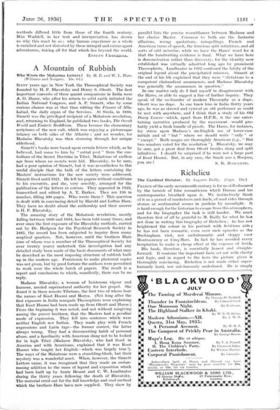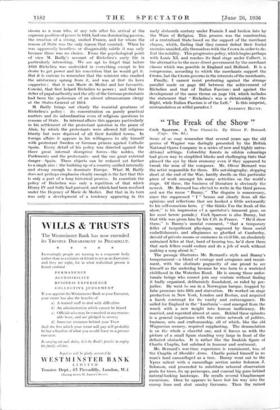Richelieu
The Cardinal Dictator. By Augusto Bally. (Cape. 15s.)
FRANCE of the early seventeenth century is for us still obscured by the tarnish of false romanticism which Dumas and his contemporaries _breathed upon it. We instinctively think of it as a period of musketeers and duels, of mad rides through storms or sentimental scenes in gardens by moonlight. It is hard enough for the historian to escape from this atmosphere, and for the biographer the task is still harder. We must therefore first of all be grateful to M. Baill for what he has not done in writing this biography of Richelieu ; he has not heightened the colour in his portrait with fictitious aids ; he has not been romantic, even over such episodes as the Buckingham visit, nor melodramatic and sloppy over Montmorency or Cinq-Mars. In fact he has avoided every temptation to make a cheap effect at the expense of truth.
His book, therefore, is essentially honest and straight- forward. It contains the important facts set out with clarity and logic, and in regard to the hero the picture given iS thoroughly convincing. Richelieu is not made either super- humanly hard, nor sub-humanly underhand. Ile is simply shown as a man who, at any rate after his arrival at the supreme position of power in 1624, had one dominating passion, the creation of a strong, unified France, and for whom the reason of State was the only reason, that counted. When he was apparently heartless or disagreeably subtle it was only because there was no choice. From the psychological point of view M. Bailly's account of Richelieu's early life is particularly interesting. We are apt to forget that before 1624 Richelieu was undecided in everything except in his desire to get power and his conviction that he would get it. But it is curious to remember that the minister who crushed the aristocracy sprang from it, and was at first its keen supporter ; that it was Marie de Medici and her favourite, Concini, that first helped Richelieu to power ; and that the defier of papal authority and the ally of the German protestants had been the spokesman of an almost ultramontane clergy at the States-General of 1614.
M. Bailly brings out clearly the essential greatness of Richelieu's policy : its concentration on purely practical matters and its subordination even of religious questions to reasons of State. In internal affairs this appears particularly in his settlement of the protestant question in the peace of Alais, by which the protestants were allowed full religious liberty but were deprived of all their fortified towns. In foreign affairs it appears in his willingness to ally himself with protestant Sweden or German princes against Catholic Spain. Every detail of his policy was directed against the three great internal disruptive forces—the nobles, the Farlements and the protestants—and the one great external danger—Spain. These objects can be reduced yet further to a single aim : the building up of a country unified internally and strong enough to dominate Europe. What M. Bailly does not perhaps emphasise clearly enough is the fact that this is only a part of a long historical process. In essentials the policy of Richelieu was only a repetition of that which Henry IV and Sully had pursued, and which had been reversed under the Regency of Marie de Medici. But that in its turn was only a development of a tendency appearing in the early sixteenth century under Francis I and broken into by the Wars of Religion. This process was the construction of a centralised State based on the support of the merchant classes which finding that -they cannot defeat their feudal enemies unaided, ally themselves with the Crown in order to de- feat the nobility. This progressive policy, which begins perhaps with Louis XI, and reaches its final stage under Colbert, is the alternative to the more direct government by the merchant classes which was possible in England and Holland. It is a compromise, according to which the merchants support the Crown, but the Crown governs in the interests of the merchants.
Finally, I cannot resist protesting against the strange parallel made on page 265 between the achievement of Richelieu and that of Italian Fascism ; and against the development of the same theme on page 134, which includes the statement that " Richelieu's was a dictatorship of the Right, while Italian Fascism is of the Left." Is this misprint, mistranslation or wilful paradox ? ANTHONY BLUNT.











































 Previous page
Previous page